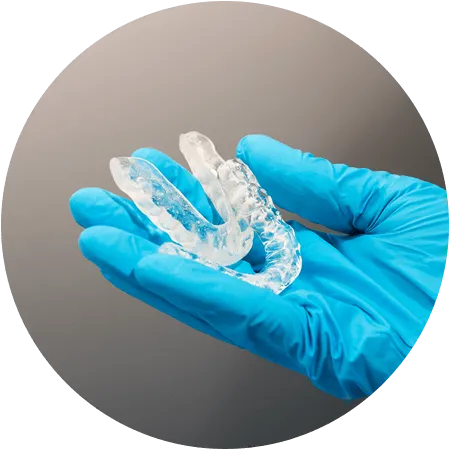If you wake up with aching teeth or jaw, you may be grinding and/or clenching your teeth at night. Otherwise known as bruxism, teeth grinding and clenching leads to excessive wear and tear which can cause cracked or broken teeth, permanent loss of enamel and tooth structure, jaw pain and headaches.
Occlusal splints for night-time wear
An occlusal splint, sometimes called a nightguard or bite splint, helps protect your teeth against grinding. The term occlusal refers to how your teeth bite together. An occlusal splint is a custom-made, durable and removable dental device which helps protect your jaw, teeth and surrounding muscles from excessive use.
If you are experiencing grinding or jaw pain, we will examine your teeth, do an occlusal analysis and talk to you about your symptoms, before we suggest a splint is made.
If an occlusal splint is suitable for you, we will take impressions of your upper and lower teeth and make models which are sent to our dental lab. Our technician then makes the splint to suit your teeth and mouth, based on the impressions and any additional information our dentist provides about your teeth and bite.
Relief of TMJ pain
Your TMJ, or Temporomandibular Joint, connects your jaw to your skull, enabling you to open and close your mouth. A dysfunction of the TMJ is known as TMJ disorder, which can cause pain in the joint and surrounding muscles, often restricting the movement of your jaw.
Occlusal splints are often used at night to avoid teeth clenching and grinding and the subsequent discomfort, pain and damage which can be caused as a result.
What does an Occlusal Splint do?
The splint will act as a buffer between your upper and lower teeth and protect them from damage due to grinding.
Using a night guard or splint can help prevent damage by:
- Protecting your teeth from further damage from grinding
- Protecting teeth against cracking/splitting or chipping
- Relieving the pressure on your teeth
- Relaxing your jaw/muscles which improves facial pain or toothache
Signs you may have TMJ disorder include:
Tenderness or pain in the jaw
Chronic facial pain
Clicking or popping of the jaw
Earaches
Pain or difficulty when chewing
Tension headache or pain in the temple region
Difficulty opening or closing the jaw or locking of the joint
Extremely worn teeth
Because they protect your teeth from further damage, you may get a rebate from your health fund, however, it is advisable to check with your fund to confirm this. For patients without health cover, the cost is usually between $630 and $690. We will provide a quote at the time of your dental consultation.
Find out more about how a splint can stop damaging to your teeth
START WITH A CONSULTATION
Talk to us about any questions you may have about occlusal splints or teeth grinding, we’re happy to help – call us or ask online.



